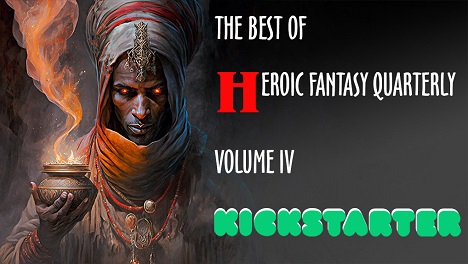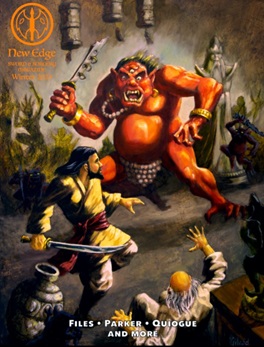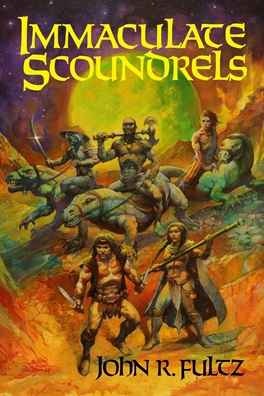DEMON-FANG
DEMON-FANG, by R. Michael Burns:
Having no means of crossing this life,
I make swordsmanship my hiding place.
–Yagyū Muneyoshi,
Heihō Kaden Sho, 17th Century
Somewhere in the deep of night, the Fang whispered, and Shadows stirred. The samurai Hokagé — Shadows-from-Firelight — opened his eyes on darkness, bitter voices crawling over him like insects. Such loss in those sounds, such mourning and misery — it struck him to the soul, as piercing as an act of seppuku. A man could lose his sanity in those murmurs, could drown in hopelessness.
Yet he dared not ignore them.
His eyes quickly adjusted to the subtle glow of moonlight on the paper shoji screens, and he gazed at the long arc of the sheathed katana in its sacred nook. In the cold blue gloom, the blade known as Makiba — Demon-Fang — called to him.
He knelt before it, placing a single hand on its hilt, its ghostly voices whimpering in his mind. At once his thoughts went stumbling back, wandering once more through the strange series of events that had first brought the cursed thing to him.
He saw again the towering phantom that had risen against the gray sky as he made his way home from the Mountain of Sorrows, a skeletal form as shifting and iridescent as the lights that danced in the skies far to the north. He had heard of such creatures — O-dokuro, wraiths born of unthinkable suffering, of deaths not attended by the proper rituals.
Somewhere nearby, a terrible slaughter had occurred.
Within his memory, he saw the skeletal giant wheel and flee, scudding across the sky like a storm cloud, its paces so long he imagined it could walk the length of the great Sanjusan-gendo temple in a single stride. Instinctively, he pursued, following it across the plains and through a maze of fallow rice paddies. Soon, at the foot of a low saw-blade of mountains, he came upon a nameless village.
Only traces of its inhabitants remained — abandoned huts, scattered belongings, furniture toppled and broken. Sliding doors wrenched from their tracks, tatami mats splashed with long-dried blood. Even the shades of the lost seemed to have forsaken that place, leaving only a profound emptiness.
The sky-striding wraith rose again and in two long steps came to the mountains, Hokagé sprinting along after it. At once his gaze snagged on a certain tangle of shadow behind a spray of bamboo. As he drew nearer, the gloom took shape — a low cavern, walls green with moss. From within came the thick odor of damp earth and stone, and something unnamable but far worse. Naginata blade probing the dark before him, Hokagé descended into the depths.
He found the Earth Spider crouching in a great net of webbing, its eight black eyes the size of rice bowls, dagger-like fangs jutting from a grotesquely feline head. Its emerald body bulged and throbbed, massive as a boulder.
For an instant, the two regarded one another, if such eyes could manage so casual an act. Then the demon lunged, maw agape, fangs snapping. Hokagé moved even as the creature sprang, stepping aside and thrusting with his long glaive. The naginata sank deep into the demon’s bulk, came free with a gout of thick white blood. The Earth Spider mewled and spun with speed that seemed impossible for such an enormous thing, whipping its barbed backside toward him. Hokagé leapt, vaulting the demon’s spiny thorax, narrowly avoiding the sticky tangle of spider-silks it expelled. He hit the ground and rolled to his feet, bringing the naginata up in a graceful waterwheel arc. With a muffled snick, the crescent blade struck the beast’s head from its body.
The Earth Spider twitched and flailed for a long time before finally falling still.
Stifling a tremor of revulsion, Hokagé took up his naginata and split wide the creature’s engorged belly. Ichor the color of rice wine dregs vomited forth, and with it a cascade of human bones — the remains, no doubt, of the lost inhabitants of that nameless village.
Then his glaive’s blade snagged on something harder, something iron-solid in the viscera of the slain demon. Steeling himself, Hokagé reached into the monster’s repulsive corpse and probed the warm, slick entrails until his gloved hand found what he sought. He wrenched it loose, drew it out, and stared at it.
It was a sword, half an arm’s span longer than any he’d ever set eyes on, and deadly-beautiful. In the gloom of the Earth Spider’s lair, the light ran over its tempered line like quicksilver, fluid and brilliant. On the naked tang, where usually the swordsmith etched his name, were two deep-cut characters. Ma kiba. Demon-Fang. He hefted the blade, feeling its weight — feeling it almost twitch, almost squirm in his grip, like an angry serpent.
He’d recognized it even then, of course, had known it for what it truly was — the monster’s metal-hard, sharp-honed heart, the source of its malign life. Such blades were legend.
For a moment, he stood holding the gore-slathered thing, studying the deep arc of its edge, the sweep of its two narrow grooves. He knew he ought to just leave it, abandon it here and bring the cavern down on it by whatever means he might. Such an item would surely bring ill fortune, would draw misery like flies to carrion.
And then it began to whisper, to mutter to him in those terrible, strangled voices — the voices of all the dead whose bones were now interred in the Earth Spider’s lair.
Then, as now, he had no desire to hear. Now, as then, he knew he could not ignore their words. The spirits of the Demon-Fang spoke only when they had something vital to tell.
Kneeling in the taut, unnatural silence of his moonlit chamber, Hokagé willed his hands steady, then took up the sword, grasped the hilt he’d fashioned for it and drew it from its lacquered scabbard.
At once the voices grew louder, harsh and dry as the crunch of dead leaves. And as they rasped their warning, the visions came as well —
— creatures with faces like half-melted tallow, moonlight shining on armor the color of dried blood —
— villagers, mad with terror, scrambling screaming through the streets of Yamagumo-machi, the village at the foot of the castle whose master Hokagé served —
— his fellow samurai rushing into the fray, meeting the battle-garbed ghosts and falling, one after the other, their weapons useless against this deathless foe —
— soil soaked with blood as if with summer rain, bodies crumpled, their heads plucked from their shoulders like overripe apricots —
— and above it all, the full white moon shining down, icily indifferent to the slaughter.
Without even seeing the clan sashimono the ghost warriors wore on their backs, Hokagé knew those men. They were Akkihito, the brigands who’d razed his birth town and killed the novice priest he had once been. The barbarians who had given him the straggling white scars that marred the left side of his face, cheek to jaw.
Hokagé’s master had trampled their forces into the earth — Hokagé himself had claimed a dozen Akkihito. But some enemies, it seemed, could not be undone, even in death.
He pictured the full moon of his vision, and knew they would come the following night — goryo, wraiths reanimated by their lust for vengeance. They would attack by the dozens, by the hundreds, and no earthly weapon would touch them. Hokagé would call his men, would stand them between the phantom horde and the innocent souls inhabiting Yamagumo Town, but they could only delay the inevitable. In every meaningful way, he knew, the wielder of the Demon-Fang would stand alone.
* * *
Beyond the walls of Hokagé’s compound, night crept slowly closer. Within, Hokagé dressed slowly, deliberately. He fastened his linen gaiters to his ankles and tied on his sandals, never rushing a single knot. Shin-guards, thigh-guards, tanned-hide gloves and padded silk sleeves, he gave every item its due attention, granted each equal importance. Adherence to procedure helped settle the mind, focusing him in the moment, denying any temptation to anticipate what might occur when night fell, to make dangerous assumptions. What might happen mattered not at all. Speculation too often proved wrong, led to error. One could but respond to events as they transpired, like a bamboo shoot bending with the swirling winds of a typhoon. He had cleansed himself with a long bath, and said prayers at the vermillion Hachiman Shrine perched on the hillside just beyond the village. The War God had saved him once before, but one couldn’t expect too much from the notoriously capricious kami. The gods’ wills were as the winds, ever-shifting, impossible to foresee.
Kneeling, Hokagé pulled his dō into place, lacquered flames blazing across the midnight-black breastplate like crimson serpents’ tongues, afterimages of the conflagration that had consumed his home and burned away the boy he’d once been. He wrapped the linen uwa obi around his waist in three tight loops, bound it with a flower knot, then attached the sodé, the banded shoulder guards protruding like wings, emblems of his high rank. Rising, he slipped his dagger into place, tied the silk cord of its sheath to his linen belt, then fastened Makiba’s scabbard to his side. Even now, the haunted katana murmured and whimpered, the chorus of the unquiet dead increasingly agitated as night drew nearer — and with it, the demonic host.
With great effort of will, Hokagé slipped the blade into its sheath and went on readying himself, never breaking the ritual. Throat guard secured, he donned his hachimaki, binding the cloth tight to his freshly-shaved dome.
In other rooms and barracks, he knew, other men now went through these same rites, readying themselves for the fight ahead. How many would not see the sun rise? Hokagé dismissed the question even as it rose to mind. Tomorrow might never come for any of them, but that didn’t matter now. With hands as steady as stone, he lifted his hoate to his face, the mask smooth and black, hiding the ragged scars that straggled from cheek to jaw. Beneath the brim of his flame-horned helmet, his face became a shadow, darkness illuminated only by the foxfire-glow of his narrow eyes. Let the Akkihito demons come. He would face them as a phantom himself, the ghost of that novice priest they’d brought down so many years ago, the last lingering shade of the flames they had set upon his innocent village.
“You expect to die tonight, of course.”
The voice, feminine dulcet and oh-so-sweet, came from behind him, but he did not turn to look at the intruder.
“That fish-boning knife of yours won’t save you,” the girl in the doorway went on, drifting into the room, sliding the screen shut behind her. “Those goryo will slaughter you and your brave samurai like so many wild boars — and then everyone else in this sorry little village.” The voice, taunting as it was, had an air of resignation to it, perhaps even mourning.
Hokagé turned, gazing at the girl. She was beautiful, pale of cheek and clad in an elegantly layered kimono. But the illusion didn’t fool him. He knew those eyes, that mocking tone. Inari-no-gohachi-himago had grown more adept at disguise, but the fox god’s thirteenth great-grandchild couldn’t hide his nature from this man whose fate karma had so thoroughly entangled with his own.
“Have you come to help, Sasa-kun,” Hokagé said, emphasizing the old nickname, Little One, which rankled the trickster so, “or only to lap up my spilled blood?”
“Euch,” the intruder muttered, wrinkling her nose, “sickening. My game is mischief, not carnage.”
Hokagé said nothing, waiting.
“I came,” the false maiden went on, “to be sure you understand just what you face tonight.”
“The Makiba has shown me all too clearly.”
“You see the angry ghosts of your old foes,” Sasa said, sitting with knees folded in a very ladylike way, clearly enjoying this show of manners. “But still you do not comprehend what will fall on this village of yours when night comes.”
“Enlighten me, then, please,” Hokagé said, kneeling opposite him.
“Haven’t you wondered why they come now? Why, so many years after your forces cut down the last of the Akkihito who didn’t flee like rats into the hills, their spirits would stir so suddenly?”
“I do not claim to understand the workings of anoyo,” Hokagé answered, using the cautious euphemism for the spirit-world — the yonder-land.
“No,” Sasa agreed. “But I do. I visit it often, as a matter of fact. And I see things, Hokagé-san. I hear things, too.” He paused. Hokagé waited. Sasa gave a frustrated sigh. “Wouldn’t you like to know what I’ve heard, what I’ve seen?”
“I am sure you will tell me,” Hokagé grumbled. Very little could try his well-worn patience, but this strange companion of his always seemed to manage.
“The Akkihito’s warrior priest, the one called Kishin. He did not die on the field of battle. Well, not entirely.”
Hokagé raised an eyebrow.
Sasa ran long fingers through illusory black hair. “His spirit fled his body, sank all the way into Yūkai, into the depths of the dead realm. But before the carrion birds could have his flesh, his spirit found its way home. He rose from where your warriors left him, with secrets he carried back from the underworld. For years he wandered and studied, discovering ancient arts and nasty little tricks from the necromancers of the Celestial Kingdom, learning how to use what he had learned in Yūkai. Readying his vengeance against Lord Kumamuné and all who serve him. He would be quite happy to take your head first, Hokagé-san.”
“So — Kishin calls the ghosts of the Akkihito dead with this Chinese sorcery,” Hokagé said, his voice registering no emotion.
“More than that!” Sasa said, abandoning the formal posture now and sprawling on the straw mats in a manner that was just short of obscene. “See — it’s only his sorcery that sustains his army. He’ll come with them as their general, leading their charge from behind the curtains of his commander’s enclosure, poisoning the air with his incantations. Making the dead hop and dance and fight like so many ugly puppets.”
“And if he is slain?”
Sasa shrugged, the gesture oddly unwieldy in his slight, feminine form. “Then perhaps the spell can be broken. But he’s no man, Hokagé-san. He is neither of this world nor of the yonder-land. No blade of mere steel can kill him. I’m sure you understand what that means.”
Hokagé touched the hilt of the sword at his hip, its whispers muted by the scabbard, but not silenced.
Yes, he understood.
Or so he believed.
* * *
He gazed into the dark beyond the town’s northeast gate as twilight deepened to night and the stars bloomed overhead. The day’s heat faded and crickets began to sing, but fitfully, as if uneasy about gracing this evening with their music. Behind the ghost in the flame-emblazoned armor, a vanguard of lesser samurai waited, while others lingered in the village, ready to give up their lives to prolong those of the villagers by even a few spare minutes. It was a paltry force, to be sure, for the bulk of Kumamuné’s army had been dispatched to the south, to stake the lord’s claim in the outcome of the war now brewing there. The rest — Lord Kumamuné’s select guard — kept their posts inside the castle. If Hokagé failed, one among them would dispatch those members of Kumamuné’s court too young or too old to fight or finish themselves, while another assisted Kumamuné’s seppuku. None of his clan would die at the hands of the Akkihito — but they would die, and the vengeance of the damned would be complete.
Hokagé let his fingers rest on Makiba’s hilt, feeling its murmurs as much as hearing them. Only the Demon-Fang could touch the coming enemy, only its unearthly blade could pierce the veil between worlds and bring down the goryo. But the knowledge brought no comfort, only another sort of misery — he knew the cost of striking down these foes. Each phantom the Fang sank its brutal tooth into would extinguish one of the innocent souls haunting the steel. Perhaps they escaped to the realm between to find their way to eventual rebirth, but even Sasa could not assure him of that. And as the human spirits guttered from the blade, the Earth Spider’s cruel power grew stronger, its fiendish voice rising over the chorus, muttering bloodthirsty lies, terrible promises. For now, the others overwhelmed it . . .
But tonight he would face an army — scores of rage-driven specters, or hundreds. How many could he destroy before the demon’s black heart reclaimed the sword — and took hold of its bearer?
It might be better to cast the weapon away and accept death, for death was surely preferable to surrendering his soul, such as it was.
Had his life alone hung in the balance, he might well have let them have it, or taken it himself before the enemy could. But hundreds of innocents, including Kumamune’s sweet daughter-in-law, Kimiko, and her young son, Kumakichi, would also die, and many in ways far worse than the thrust of a blade into a soft abdomen.
He closed his hand on Makiba’s hilt, gently, and waited. His men had their orders. If they fled when their enemy came, he would not blame them. He would only pity their inglorious deaths.
All around — in the space of a single breath — the cricket-song stopped.
Behind Hokagé, the men shifted in their armor.
Now the moon, full as a dewdrop in a spider’s web, broke over the eastern hills, its silver light washing across the road, deepening the long tree-shadows there.
A sound rose, a drumming patter like a sudden, heavy fall of rain, though no clouds marred the star-strewn night.
Then the army of the dead surged from the darkness and came on in a storm, jaws agape in ravenous fury, eyes hideously wide.
Hokagé drew Demon-Fang and stepped into a ready stance. And as the ghostly horde cascaded toward him, he opened himself to the sword, let it reach into his thoughts, draw his mind into its terrible depths. Revulsion flooded through him at once, smothering. He felt like a man buried alive in a mass grave, crushed between writhing, deathless corpses. Submerged in Makiba’s fathomless dark, he felt them — those shōryō, those imprisoned souls, straining and crying, their whispers turned to screams, their essences sizzling like lightning along the arc of the blade. Somewhere in their midst, the pitiless soul of the spider demon raged, mad with the hunger to keep those tortured spirits close — its prisoners, its playthings.
Every one of those voices, human and demon alike, cried out for carnage.
Hokagé lowered his head and rushed into the throng.
Makiba flicked and danced, hewing through malformed men as insubstantial as fog, obliterating them, one after another after the next. And as each goryo shattered and ceased to be, Hokagé felt a truly human soul within the sword vanish as well — an apprentice calligrapher, who did masterful work despite a malformed hand; an old farmer, whose skin had smelled of rice paddy mud; a girl child, who had dreamt only of learning the ways of a proper lady; a carpenter, who had thought the Earth Spider a mere figment of his drunken imagination, until its jaws split his flesh . . . Hokagé sensed the sudden extinction of each of them, as piercing-sharp as dagger wounds. Yet he fought on, slashing his way against the spectral current, cutting the Akkihito ghosts down just as he had when they lived, even as dozens more trampled past. From behind him came unthinkable sounds: wet, strangled shrieks of agony followed by dull crashes of armored bodies slouching to the earth. He paid no attention — he had none to spare.
Ahead, a vague rectangular outline hung oddly still amid the seethe and flow of the onslaught — linen curtains, tattered and ill-kept. He could see the eye-like mon of the Akkihito clan emblazoned upon them, gazing at him, daring him to approach.
Creatures with sagging, semi-human faces and too-familiar armor stepped before him, groping for him with hands twisted into massive claws, talons capable of wrenching a man’s head from his shoulders. Hokagé dodged and thrust. Demon-Fang bobbed and pierced. Two goryo and two innocent souls ceased to be, and then three more. Hokagé’s own spirit bled. From Makiba, he heard the mewling cry of the demon, ever louder, stronger.
But he could end it, now, if only he found the strength.
Hokagé slashed the maku curtains apart and stepped inside the battlefield commander’s enclosure.
The sorcerer Kishin sat within, clad in a daimyo’s wing-shouldered hakama, legs folded under him. His gaunt, gray-bearded face turned upward, lips twitching as he muttered unintelligible incantations. Hokagé raised his sword.
Kishin opened his eyes.
Hokagé faltered. He gazed into those yellow eyes — and froze with hideous realization.
The deathless sorcerer’s voice rose to a shout, a screech that pierced Hokagé’s mind like daggers and he stumbled, staggered, fought to keep his feet. Tallow-faced wraiths in field generals’ garb burst into the enclosure, their ghostly infantry following, rushing on like a tsunami. Hokagé cut them down in broad swaths like a farmer clearing young bamboo, swinging half-blind, mind ablaze with the agony of Kishin’s hellish spell, and all the guttering whimpers of the innocent souls as they were torn from Demon-Fang’s steel. He would not let himself hear them, would not let himself glimpse the lives he extinguished as he swept away the enemy. He could not allow himself such luxuries of compassion, even if the agony finally tore his sanity to shreds. Only the yellow-eyed sorcerer at the heart of the maelstrom mattered.
Whatever had reawakened Kishin’s flesh, it was no human spirit, or human no longer — those fire-flicker eyes revealed the truth. They were the eyes of a demon, a denizen of the deepest Hells. Looking into them, Hogaké knew what had to be done — the only hope of ending this slaughter.
For the briefest of instants, he cast all other thoughts aside. He heard no screams, no deadly incantations, felt no injury, saw not a flutter of movement. He drew a deep breath, focused his consciousness to a fine, bright point.
Then he lunged, through the chaos of onrushing goryo, screaming out a battle cry that seemed to chill the dead themselves. Makiba plunged into the heart of the man seated behind the curtain, and as it did Hokagé poured himself into the haunted blade, filling the otherworldly steel with his ki, his life’s vital force, feeling it join with hundreds of others. Together, the spirits fought, pressing, crushing, wringing the Earth Spider’s essence from the metal, pouring it into the body of the jabbering sorcerer. The spirit leapt through Kishin like lightning through stormclouds.
Caught in the same flesh, the demons did as demons would — they fought one another for the territory. And tore it apart in their struggle.
Kishin’s evil words turned into a thick gurgle. His eyes blazed wide and he doubled over, vomiting crimson gore. Blood bloomed like black flowers on his filthy coat as his skin split in a dozen, two dozen, ten dozen places. Bones snapped like kindling in a blazing fire. Kishin threw back his arms, made a twitching motion as if to rise . . . then sagged into a damp scarlet heap and moved no more.
The sounds of battle ceased at once. Only the murmurs of befuddled men and the moans of the still-dying stirred the night silence.
Hokagé withdrew Demon-Fang from the deflated remains of the sorcerer and held it aloft. For a moment, he thought the sword’s voices had fallen silent, obliterated in that final act. But . . . there. A few remained — subdued, muted, yet present still. And yet. . .
As he listened, it seemed the sounds came not from the blade, but from within him, from the depths of his own mind.
“I wondered if you’d realize what was required of you,” came a voice, close by. Hokagé glanced sideways, not surprised to see a small red fox sniffing at the tattered remnants of the maku. “Seems you’re a scintilla more clever than I’d thought.”
“And the Demon-Fang?” Hokagé asked. “I suppose it is mere metal now.” As he said it, he found the idea rather comforting.
“Not all of the spirits are gone from it, Hokagé-san,” Sasa said. “HYou gave a part of yourself to the Fang, and the Makiba returned the gift in kind. There is much of your soul in it now, and much of it in you. I’d keep it close, were I you. It is said that a samurai’s sword is his soul, né? Well, in your case, it’s the literal truth. You are as tied to its destiny as . . . well, as I am to yours.” Sasa snorted. “Rather sad, really.”
Hokagé merely nodded. Then, silent, he slipped Makiba back into its scabbard, feeling its weight, its cool presence at his side.
“Let us hope, then,” he said, “that fate shall be kind to us all.”
________________________________________________________
R. Michael Burns is a Colorado native with a background in theater, philosophy, and other dark arts. His fiction has appeared in numerous magazines, e-zines, and anthologies. He lived in Japan for the better part of five years, teaching English and seeing as much of the country as he could manage. He asks that anyone who enjoyed this tale consider donating to the American Red Cross’s Japanese Tsunami Disaster Relief Fund. You can do so by clicking here.





